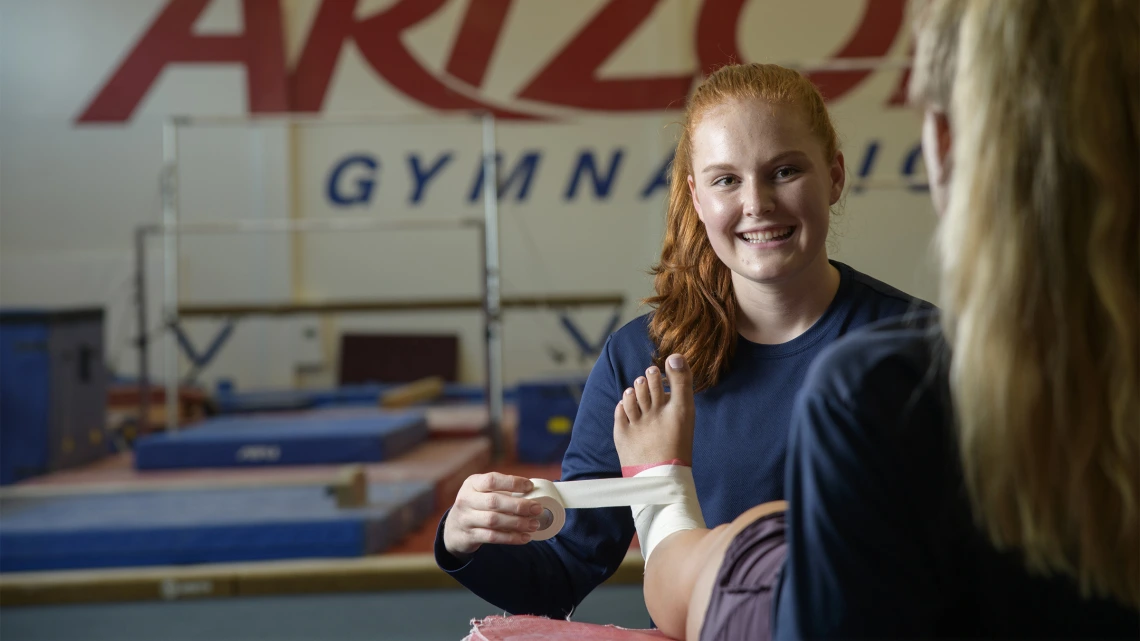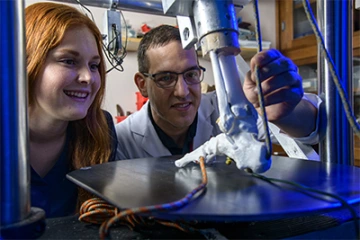Health Sciences Researchers Study How Common Antibiotics Weaken Tendons
University of Arizona undergraduate Mikayla Campagne is part of a research team examining the link between antibiotics and the increased risk of tendinitis and Achilles tendon ruptures. Their work will help clinicians identify weak points in the tendons t

In addition to her role as an undergraduate research assistant, Mikayla Campagne works as an athletic training technician for the UArizona women’s gymnastics team.
Growing up, Mikayla Campagne was an avid soccer player. Multiple orthopaedic injuries forced her to retire from the sport, but brought about a love of physical therapy and sports medicine. Campagne’s past personal experiences with sports injuries led her to the Szivek Orthopaedic Research Lab at the University of Arizona College of Medicine – Tucson. There, as an undergraduate research assistant, she helps researchers study how a common antibiotic alters the Achilles tendon, the site of injury for countless active and athletic people.
A class of antibiotics called fluoroquinolones is among the most frequently prescribed antibiotics in the United States. Cipro (ciprofloxacin), levofloxacin (Levaquin), pefloxacin, norfloxacin (Noroxin), moxifloxacin (Avelox) and ofloxacin (Floxin) are some of the fluoroquinolones that effectively prevent and treat a broad range of serious bacterial infections, including respiratory, urinary tract and gastrointestinal infections.
However, safety concerns about these drugs have gained increased attention in recent years, particularly about the risk of tendinitis and Achilles tendon ruptures. Among these concerns are recent findings that fluoroquinolones could weaken the structure of normal connective tissue, especially tendons, sinewy cords that attach muscles to bones.

Physiology major Mikayla Campagne and David Margolis, MD, PhD, assistant professor of orthopaedic surgery, study the effects of antibiotics on the Achilles tendon.
These concerns led UArizona Health Sciences researchers David Margolis, MD, PhD, assistant professor of orthopaedic surgery, biomedical engineering and physiology, and David Falgout, MD, orthopaedic surgery resident, to study further the link between fluoroquinolone and the increased the risk of tendinitis and tendon rupture. More specifically, they are trying to determine how long it takes the tendon to heal after stopping ciprofloxacin. Campagne, a senior physiology major, is working with the researchers for her physiology honors thesis under the mentorship of Dr. Margolis.
About 90% of the fluoroquinolone-induced tendinitis and tendon ruptures affect the Achilles tendon, but the injuries also can occur in other areas of the body, such as the shoulder and hand. Also, ciprofloxacin and pefloxacin have been shown to cause the greatest deterioration of the tendon.
“Previous studies examined the associated tissue abnormalities that occur with administration of a fluoroquinolone. However, to the best of our knowledge, no one has examined how long it takes for the tendons to return to normal after discontinuation of fluoroquinolones,” Campagne says.
“I love the drive and dedication that researchers have about the work they do, and hope to integrate research into my career path.”
Mikayla Campagne, undergraduate research assistant in the Szivek Orthopaedic Research Lab at the UArizona College of Medicine – Tucson
The study will measure the biomechanical properties of Achilles tendons at different time points following a course of ciprofloxacin. They also will use ultrasound elastography, an imaging technology sensitive to tissue stiffness, to measure the biomechanical properties of the tendons at set time intervals after discontinuing the antibiotic. If successful, ultrasound imaging may provide a cost-effective, non-invasive method to screen patients before allowing them to return to strenuous activity following a course of fluoroquinolone treatment.
Fluoroquinolone-associated tendon rupture is marked by pain, with other symptoms including swelling, tenderness and warmth over the tendinopathic sites. Although most adverse reactions occur after two weeks of drug therapy, they can occur a few hours after the initial dose, or as long as six months later. In some cases, fluoroquinolone use can lead to complete rupture of the tendon and substantial subsequent disability.
In addition to her role as an undergraduate research assistant, Campagne works as an athletic training technician for the UArizona women’s gymnastics team. As an athletic training technician, she works with medical professionals, deepening her understanding of sports-related risks, injuries and treatments. She attends the gymnastics team’s practices and home meets and assists the athletic trainer with physicals, rehabilitation regimens, tapings and emergencies.
“The risk for the injuries is higher for those who live an active lifestyle,” Campagne says. “We are starting with the Achilles tendon, but hope to look at other tendons, such as patellar (kneecap) and tricep tendons, to see if similar issues arise.”
A class of commonly prescribed antibiotics called fluoroquinolones could weaken the structure of normal connective tissue — especially tendons.
Campagne says the goal is to provide clinicians the ability to perform an ultrasound on a patient and identify the abnormalities and associated weak points to assess risks. “If the abnormality can be seen before the tendon tears, patients can be advised to abstain from particular activities for a certain amount of time until the risk is gone.”
After graduating, Campagne plans to pursue a doctorate in physical therapy, specializing in pediatric or sports physical therapy. “I had to attend physical therapy after each of my injuries and I love how you build a special bond with the therapists. They always seem so happy and so passionate about their job. I also love the drive and dedication that researchers have about the work they do, and hope to integrate research into my career path.”

